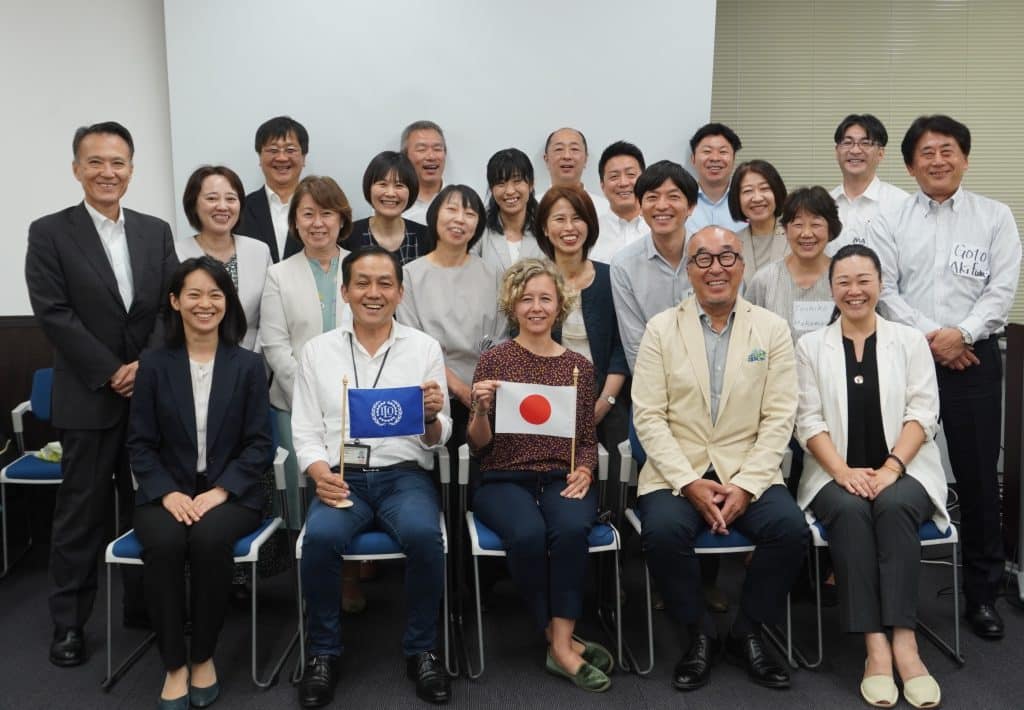“We have learned what works and doesn’t work in the ready-made garment industry,” said Minna Maaskola-Desprez, a Senior Technical Specialist at Better Work who has trained garment industry stakeholders around the globe for the past ten years. “But what impact could our work have in other industries’ and sectors’ supply chains?”
The answer to that question came in June 2023 when Better Work conducted a facilitation training seminar geared toward labour and social security attorneys in Tokyo, Japan. The Japan Ministry of Economy, Trade, and Industry (METI) funds the “Building Responsible Value Chains in Asia through the Promotion of Decent Work in Business Operations” project, which covers some Better Work countries to help build responsible supply chains. As part of a larger global focus on Human Rights Due Diligence (HRDD), last September, the Government of Japan released its own Guidelines on Respecting Human Rights in Responsible Supply Chains; this is one of Japan’s initiatives on HRDD. HRDD policies and regulations are being developed and implemented by G20 nations including Japan to address human rights abuses in global supply chains. With support from METI, the ILO partnered with the Japan Federation of Labour and Social Security Attorneys’ Association to train attorneys from across Japan on how best to advise enterprises, especially small and medium-sized enterprises, to implement the newly released guidelines in their operations. With HRDD applying to all industries, the prospect of a training seminar in Tokyo provided an opportunity for Better Work to test its unique approach to training and capacity building in sectors outside the apparel industry.
This is part of a broader collaborative effort between Better Work, ILO-Tokyo, and Sharoushi Association, a professional association of attorneys specialized in labour and social security issues, numbering around 44,000 members. Building on the foundation e-learning course on Business and Human Rights developed by Sharoshi Association and ILO-Tokyo, Better Work joined forces to develop an advanced training and training of trainers (ToT). The aim of the effort is to equip lawyers to be able to give advice in terms of human rights due diligence for corporations, particularly SMEs, to prevent human rights violations in their activities and to promote socially responsible conduct. The scope is also ambitious – the association aims to train 600 of their members on business and human rights, so that they can function as experts in the field.

Maaskola-Desprez planned and led the first in-person training-of-trainers seminar in Tokyo this spring. Initially, the participants met remotely with the ILO-Tokyo team and Maaskola-Desprez. In the remote sessions, they learned the theories and principles behind Better Work’s facilitation methods, which are learner-centred, participatory and andragogical (for adults, rather than pedagogical, for children). For the third session, participants traveled to Tokyo to practice in-person the facilitation skills they had learned online. The aim of the training seminar was to equip participants not only with knowledge of HRDD, but also the necessary tools to train other attorneys across Japan in business and human rights. To that end, the practice session in Tokyo involved case studies, simulations and role playing as participants learned how to negotiate the different perspectives of various stakeholders involved in implementing HRDD.
Ms. Megumi Nikimoto, a participating attorney, commented, “The practice session helped me realize that in order to facilitate confidently I need to continue equipping myself with knowledge on business and human rights.” Ms. Nikimoto’s words were echoed by many participants who found Better Work’s unique approach eye-opening and revelatory. “Everything was a new experience, from the style of the training to being a facilitator,” commented Mr. Ken Matsumoto. The next steps for this group of attorneys is to go on and train their colleagues to create a pool of specialists on HRDD.
In the practice session, participants focused on how to support stakeholders in finding common ground. Reflecting on that session, one participant said, “The most important key term was bridge.” A key feature of Better Work’s training is its emphasis on empowering stakeholders at the local level to build those bridges for themselves. According to Maaskola-Desprez, “prevention and remediation happen at the local level. Only by fostering a sense of ownership and partnerships on the ground can our work be sustainable.” Better Work plans to conduct another round of facilitation training in Japan later this year, an auspicious sign of its broadening role in creating positive change in the global supply chain.
As Maaskola-Desprez stated, “What we have done in the garment industry can be replicated elsewhere. The success of the seminar in Tokyo is a testament to that. What else can we do?”